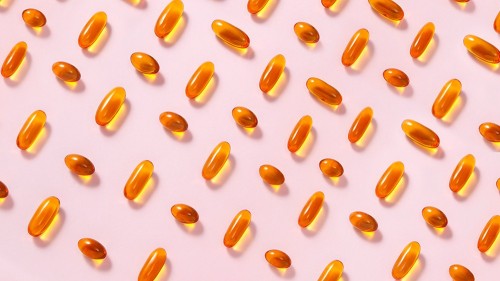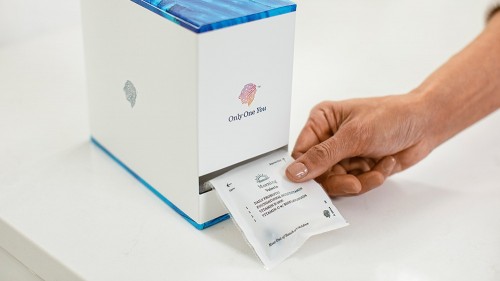Dietitian Talks Zinc: Its Vital Roles, Deficiency Signs, and Safety Tips
Last Updated on February 5, 2024
Medically Reviewed by Anthony Dugarte, MD
Getting enough zinc supports your immune system, heals wounds, and keeps your skin healthy. Get tips from a dietitian on the best food sources, recommended daily intake, deficiency symptoms, and safe supplementation.


Key Highlights
-
Zinc plays critical roles in immunity, protein synthesis, DNA repair, antioxidant activity, and wound healing. Getting enough zinc supports overall health.
-
Oysters, beef, crab, nuts, dairy, and fortified cereals are excellent food sources of zinc. Vegetarians may need more zinc due to lower absorption from plant sources.
-
Adults need 8mg of zinc daily. Deficiency is more common with digestive disorders, alcoholism, infections, and chronic diseases.
-
Zinc lozenges may shorten the duration and severity of the common cold when taken soon after symptoms start.
-
High supplemental zinc doses can cause side effects like nausea and copper deficiency. 40mg daily is considered the tolerable upper limit for adults.
What Is Zinc?
Zinc is an essential nutrient that plays a vital role in various processes within your body. It supports protein synthesis, DNA synthesis, immune functioning, and wound healing.
This vital nutrient also supports normal growth and development throughout pregnancy and in childhood and adolescence.
Zinc can also act as an antioxidant within your body. Antioxidants are essential compounds that can help protect cells in your body from damage caused by free radicals.
Free radicals are harmful chemicals that can contribute to the aging process and the development of several health conditions, including heart disease, asthma, diabetes, dementia, and some cancers.
Your body doesn’t make or store zinc, so daily zinc intake is required for optimal levels to help support your wellbeing.
Zinc is naturally present in some foods, added to others, can be found as a dietary supplement, or added to some over-the-counter medications.
Zinc Benefits
You may be wondering what zinc does for the body. Surprisingly, zinc is the second most abundant trace mineral in your body and works in every cell.
As mentioned previously, zinc plays many vital roles within your body and comes with a host of health benefits.
The following are the health benefits of zinc:
Skin Health
Zinc plays an essential role in enhancing the health of your skin by helping to produce collagen, decreasing inflammation, and promoting immune functioning.
Interestingly, the top layer of your skin contains more zinc than the layers underneath.
Since zinc is responsible for supporting the growth of new, healthy skin cells, having adequate amounts can provide a host of skin health benefits.
Zinc can help treat skin lesions, decrease the severity of acne, and even reduce the signs of aging.
You’ll often find zinc oxide in wound healing products and sunscreen. This compound has been shown to promote wound healing and protect the skin from the sun’s harmful rays.
One 2014 review of studies on zinc’s role in dermatology found that zinc can be used for many skin disorders, including leg ulcers, pressure ulcers, diabetic foot ulcers, eczemas, and various skin infections. (1)
In addition, a 2020 review found that zinc benefits many inflammatory skin conditions such as acne, dermatitis, and diaper rash. (2)
Immune Functioning
Zinc is vital for your immune system to function and helps to support essential immune cells, including neutrophils and killer cells.
Studies have shown that people who are deficient in zinc are more susceptible to infections. (3)
Zinc also appears to play a role in reducing the severity of the common cold.
A 2013 review of 18 studies found zinc lozenges (at least 75 mg a day) taken within 24 hours of the onset of symptoms reduced the duration of cold symptoms in healthy people. (4)
A 2020 review found similar benefits, with zinc supplementation decreasing cold duration by 2.25 days. (5)
Another 2013 study concluded that zinc lozenges, when given within 24 hours of the onset of a common cold, can be very effective in decreasing the duration and severity of a cold. (6)
Researchers believe that zinc inhibits the replication of some viruses and has antioxidant and anti-inflammatory properties, which may help to reduce the duration and severity of a cold.
Reduces the Risk of Certain Age-Related Diseases
Zinc may help reduce the risk of infections in older adults and reduce the risk of developing age-related macular degeneration (AMD).
One older clinical trial sought to evaluate the effect of high-dose vitamins C and E, beta carotene, and zinc supplements on age-related macular degeneration (AMD). (7)
The 3,640 participants were randomly assigned to daily receive orally one of the following:
- Antioxidants (500 mg of vitamin C, 400 IU of vitamin E, and 15 mg of β-carotene)
- Zinc (80 mg as zinc oxide) and copper (2 mg as copper oxide)
- Antioxidants plus zinc
- Placebo
The group taking the antioxidants plus zinc supplements experienced a reduced risk of developing AMD by 25% and vision loss by 19%.
The risk of developing AMD in the group taking zinc and copper was reduced by 21% and vision loss by 11%.
One 2013 study showed that zinc supplementation (45 mg a day of zinc) in elderly participants decreased the incidence of infections by nearly 66%. (6)
Researchers also found that stress markers and inflammation within the body were significantly reduced with zinc supplementation, suggesting that zinc may effectively prevent some chronic diseases.
How Much Zinc Do You Need Per Day?
Most healthy adults require 8 mg of zinc per day. The Recommended Dietary Allowance (RDA) for zinc is the average daily level of intake sufficient to meet the nutrient requirements of nearly all healthy people.
The current RDAs for zinc are as follows: (8)
| Age | Male | Female | Pregnancy | Lactation |
|---|---|---|---|---|
| 0–6 months | 2 mg | 2 mg | - | - |
| 2–12 months | 3 mg | 3 mg | - | - |
| 1–3 years | 3 mg | 3 mg | - | - |
| 4–8 years | 5 mg | 5 mg | - | - |
| 9–13 years | 8 mg | 8 mg | - | - |
| 14–18 years | 9 mg | 9 mg | 12 mg | 13 mg |
| 19+ years | 8 mg | 8 mg | 11 mg | 12 mg |
Who Is at Risk for Zinc Deficiency?
A severe zinc deficiency isn’t very common but can be seen in specific populations.
People at risk of a zinc deficiency include those with digestive disorders who don’t absorb this nutrient well. Additionally, people with chronic liver or kidney disease and alcoholism are at risk for zinc deficiency.
Prolonged diarrhea can lead to a zinc deficiency and severe medical conditions such as burns or sepsis, which can increase the body’s need for zinc.
Other groups at risk for zinc deficiency include:
Pregnant and Lactating Women
During pregnancy, the fetus has increased zinc needs. Breastfeeding can also reduce a mother’s zinc supply.
Consequently, the RDA for zinc is higher for pregnant and breastfeeding women than for other women.
Older Infants Who Are Exclusively Breastfed
Breastmilk will provide adequate amounts of zinc for a baby’s first 4–6 months of life. However, breastmilk does not provide the recommended amounts of zinc for infants aged 7–12 months. Therefore, this age group should consume zinc-containing foods such as small pieces of hamburger meat or chicken, yogurt, and chickpeas.
There are some circumstances in which children may benefit from a zinc supplement to improve their growth rate. One 2018 meta-analysis found that zinc supplementation in infants and young children supported healthy growth and led to increased height and weight. (9)
Vegetarians and Vegans
For vegetarians and vegans, zinc intake is limited to plant foods, which aren’t as easily absorbed as the zinc from animal foods.
Additionally, vegetarians typically have a higher intake of legumes and whole grains, which contain phytates (a compound found in plant seeds) that bind zinc and reduce its absorption.
For these reasons, vegetarians can sometimes require 50% more of the RDA for zinc than non-vegetarians.
Zinc Deficiency Symptoms
According to the National Institutes for Health, a zinc deficiency is characterized by delayed growth in infants and children, loss of appetite, and decreased immune functioning. (8)
In more severe deficiency cases, a person may experience hair loss, diarrhea, low testosterone production in men, eye and skin lesions, weight loss, impaired wound healing, and taste abnormalities.
Zinc deficiency is difficult to assess using a blood test; therefore, you may still be deficient even if a test indicates normal levels.
Your healthcare provider will consider your food intake, digestive issues, and various symptoms when determining your need for a zinc supplement.
Food Sources of Zinc
Animal products, like shellfish and meat, contain high amounts of zinc that your body can easily absorb. Red meat and chicken provide the majority of zinc in the American diet.
There are plant-based sources of zinc, which include beans, nuts, fortified breakfast cereals, and dairy products.
Foods highest in zinc include the following: (8)
| Food | Milligrams (mg) Per Serving |
|---|---|
| Oysters, 3 ounces | 74 |
| Crab, 3 ounces | 6.5 |
| Beef, 3 ounces | 5.3 |
| Lobster, 3 ounces | 3.4 |
| Pork chop loin, 3 ounces | 2.9 |
| Baked beans, 1/2 cup | 2.9 |
| Breakfast cereal, fortified, one serving | 2.8 |
| Chicken, dark meat, 3 ounces | 2.4 |
| Pumpkin seeds, 1 ounce | 2.2 |
| Yogurt, 8 ounces | 1.7 |
| Cashews, 1 ounce | 1.6 |
| Chickpeas, 1/2 cup | 1.3 |
| Cheese, Swiss, 1 ounce | 1.2 |
| Milk, 1 cup | 1 |
Zinc Supplementation
You may find zinc supplements in the form of tablets and capsules, but zinc is also a popular ingredient that can be added to lozenges (cough drops).
You may also come across zinc in homeopathic products that treat and prevent colds.
For adults who require zinc supplementation, the recommended daily dosage is typically 15–30 mg per day. (1)
However, it is always best to speak with your healthcare provider before taking zinc or any other supplement to ensure its safety for you.
Safety and Side Effects
While generally safe, zinc supplementation can cause a variety of negative symptoms when taken in excessive amounts.
Zinc supplementation, particularly when taken in doses that exceed 40 mg per day for adults (called the tolerable upper intake level), can cause adverse side effects, including nausea, vomiting, loss of appetite, abdominal cramps, diarrhea, headaches, and fatigue. (8)
Zinc can interfere with the absorption of copper, leading to a deficiency of this vital mineral over time.
Moreover, zinc supplementation may decrease the effectiveness of antibiotics and a medication called penicillamine, which is used to treat rheumatoid arthritis.
The tolerable upper intake levels (ULs) for zinc are as follows: (8)
| Age | Male | Female | Pregnant/ Lactating |
|---|---|---|---|
| 0–6 months | 4 mg | 4 mg | - |
| 7–12 months | 5 mg | 5 mg | - |
| 1–3 years | 7 mg | 7 mg | - |
| 4–8 years | 12 mg | 12 mg | - |
| 9–13 years | 23 mg | 23 mg | - |
| 14–18 years | 34 mg | 34 mg | 34 mg |
| 19+ years | 40 mg | 40 mg | 40 mg |
The Bottom Line
Zinc plays many vital roles in your body. From supporting the health of your skin to protecting against infections as you age, having an adequate intake of this nutrient is important for your health and longevity.
If eating a balanced diet containing various foods, you’re likely getting the zinc you need through your food intake.
However, if you have digestive issues, follow a vegetarian or vegan diet, or are at risk for a zinc deficiency for another reason, taking a zinc supplement under the direction of your health care provider may benefit you.
It’s important not to exceed the recommended dosage for zinc intake as this can lead to serious side effects and interfere with the absorption of other essential nutrients and medications.
If you and your healthcare provider decide that you may benefit from taking a zinc supplement, take it at least 1 hour before or 2 hours after your meals for increased effectiveness.
With that said, if your zinc supplement causes stomach upset, it can be taken with a meal.
At WellnessVerge, we only use reputable sources, including peer-reviewed medical journals and well-respected academic institutions.
- Zinc Therapy in Dermatology: A Review:
https://www.ncbi.nlm.nih.gov/pmc/articles/PMC4120804/ - Effects of Zinc Supplementation on Inflammatory Skin Diseases: A Systematic Review of the Clinical Evidence:
https://pubmed.ncbi.nlm.nih.gov/31745908/ - Zinc in Infection and Inflammation:
https://www.ncbi.nlm.nih.gov/pmc/articles/PMC5490603/ - Zinc for the common cold:
https://www.cochranelibrary.com/cdsr/doi/10.1002/14651858.CD001364.pub4/abstract - Zinc Supplementation Reduces Common Cold Duration among Healthy Adults: A Systematic Review of Randomized Controlled Trials with Micronutrients Supplementation:
https://pubmed.ncbi.nlm.nih.gov/32342851/ - Discovery of Human Zinc Deficiency: Its Impact on Human Health and Disease1,2,3:
https://www.ncbi.nlm.nih.gov/pmc/articles/PMC3649098/ - A randomized, placebo-controlled, clinical trial of high-dose supplementation with vitamins C and E, beta carotene, and zinc for age-related macular degeneration and vision loss: AREDS report no. 8:
https://pubmed.ncbi.nlm.nih.gov/11594942/ - National Institutes of Health: Zinc:
https://ods.od.nih.gov/factsheets/Zinc-HealthProfessional/#en42 - Effect of Zinc Supplementation on Growth Outcomes in Children under 5 Years of Age:
https://www.ncbi.nlm.nih.gov/pmc/articles/PMC5872795/






